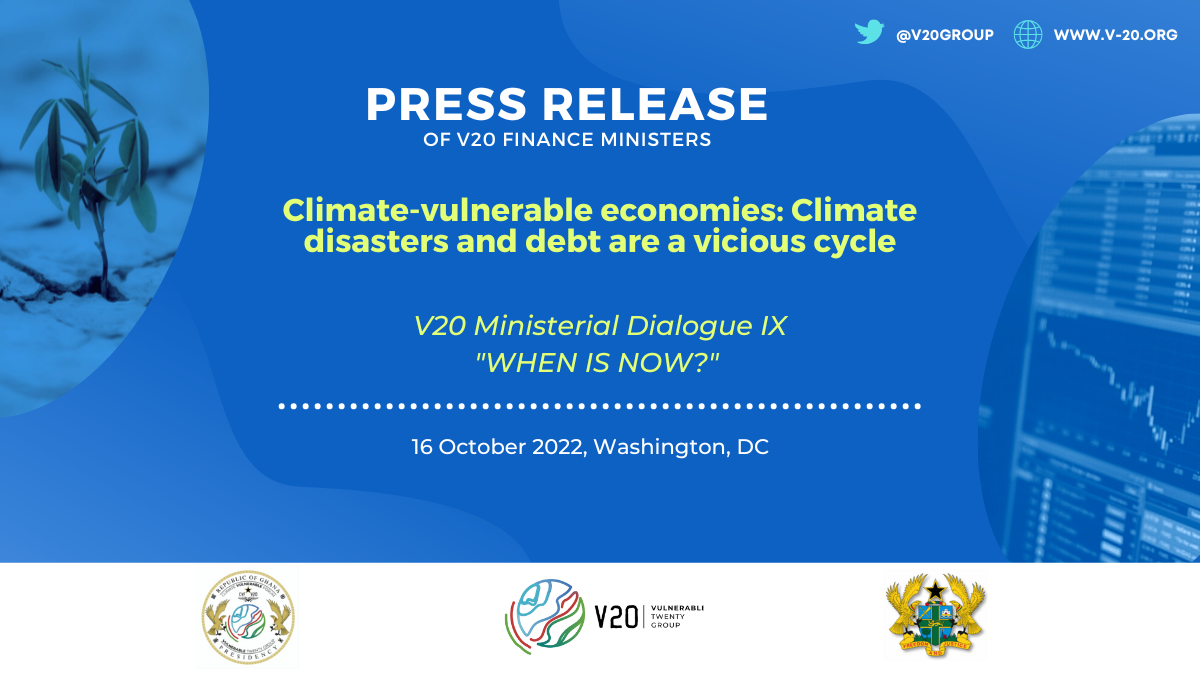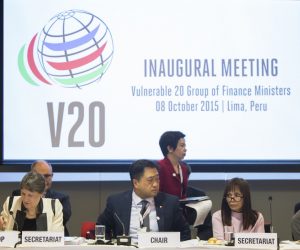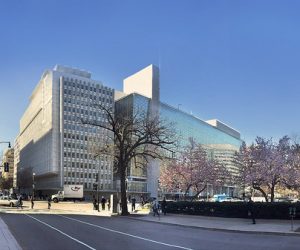Climate-vulnerable economies: Climate disasters and debt are a vicious cycle

V20 Ministerial Dialogue IX: “When is Now?”
16 Oct 2022, Washington DC – The V20 Group of Finance Ministers from 68 climate-vulnerable economies today demanded reforms in the global financing architecture as they face mounting economic threats from climate disasters and debt. V20 countries have at least USD435 billion of debt servicing payments due in four years at a time when new investment is severely needed, the Group noted in its V20 Ministerial Dialogue IX Communique.
The combination of high debt servicing costs and climate change represents a systemic risk to climate-vulnerable economies that can trigger a vicious cycle that depresses revenues and exchange rates, while increasing inflation and the cost of capital including for investments to respond to climate shocks themselves – all are factors that exacerbate climate vulnerabilities. Climate change shocks and disasters have already eliminated USD525 billion from V20 economies in the past 20 years, according to research commissioned by the Group.
“As economic managers, it has long been clear to us that climate change is not a distant challenge. It has set ablaze not only many of the world’s forests but also our fragile national budgets. Climate change is simply compounding existing and increasingly acute fiscal stress. The international financial architecture must become fit for climate and for our development ambitions, and it must support and not detract from transformational changes needed in the real economy towards our common prosperity,” remarked Ken Ofori-Atta, Ghana’s Finance Minister and current V20 Chair in his keynote speech.
“Climate change has already eliminated one fifth of our wealth – in other words V20 economies would be 20% wealthier today had we not been suffering the daily toll of climate loss and damage. In aggregate dollar terms, this is half a trillion in losses. And for the most at-risk countries, economic losses exceed half of all growth since 2000. For the most at-risk V20 economies, the loss exceeds total growth. We are experiencing losses and damages from the climate emergency everyday, and yet we have contributed the least to emissions,” said President Mohamed Nasheed of the Maldives.
Other pressing calls from the V20 Ministerial Dialogue IX Communique include the following:
- Immediate reform of the sovereign debt restructuring architecture. Then, through guarantee facilities and regulatory action all creditor classes to be compelled to reduce the level of debt in V20 countries in order for them to mobilize financing for their climate and development goals.
- Called on all international financial institutions and their major donors to consider debt flexibility in order to free up capital for investment in growth-spurring climate action.
- For multilateral financing institutions to specify their commitment to climate investment and to deliver at least a doubling in international finance for adaptation within the next 30 months, with all Multilateral Development Banks (MDBs) ensuring their climate portfolios are at least 50% focused on climate adaptation.
- Further allocations of Special Drawing Rights, some of which should be ‘rechanneled’ into the IMF’s newly created Resilience and Sustainability Trust that to be enshrined in country ownership whereby V20 Climate Prosperity’s Plans form a core of recovery efforts.
- The delivery of the minimum USD100 billion a year goal commensurate with the emergency nature of the fallout of the global climate breakdown as it harms V20 economies and developing nations most, while calling for clear evidence of results through an update to the $100 billion Delivery Plan by COP27.
- For developed countries to urgently come forward with a standalone Implementation Plan of the UNFCCC COP26 decision for developed countries to at least double their collective provision of international climate finance for adaptation by 2025 towards a 50:50 balance between adaptation and mitigation finance, and to prioritize a high and increasing emphasis on grant-based funding for adaptation for frontline communities and economies.
The group also urged the World Bank and IMF to officially recognize V20 as an official constituency of the IMF/World Bank Group as it represents the common priorities and interests of 68 of the world’s most climate threatened developing economies.
ABOUT V20
Formed in 2015, the V20 Group of Finance Ministers is a dedicated cooperation initiative of economies systematically vulnerable to climate change. It is currently chaired by H.E. Ken Ofori-Atta, the Hon. Minister of Finance of the Republic of Ghana. The V20 membership stands at 58 economies representing some 1.5 billion people including Afghanistan, Bangladesh, Barbados, Benin, Bhutan, Burkina Faso, Cambodia, Chad, Colombia, Comoros, Costa Rica, Côte d’Ivoire, Democratic Republic of the Congo, Dominican Republic, Eswatini, Ethiopia, Fiji, The Gambia, Ghana, Grenada, Guatemala, Guinea, Guyana, Haiti, Honduras, Kenya, Kiribati, Kyrgyzstan, Lebanon, Liberia, Madagascar, Malawi, Maldives, Marshall Islands, Mongolia, Morocco, Nepal, Nicaragua, Niger, Palau, Palestine**, Papua New Guinea, Philippines, Rwanda, Saint Lucia, Samoa, Senegal, South Sudan, Sri Lanka, Sudan, Tanzania, Timor-Leste, Tunisia, Tuvalu, Uganda, Vanuatu, Viet Nam and Yemen.
**As a UN non-member observer state
MEDIA CONTACT:
Nabiha Shahab, [email protected], +62 813 1421 3432
@V20Group




